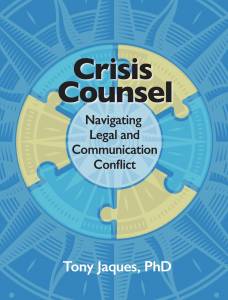Size – and Experience – Really Matter When a Crisis Strikes. Just ask McDonald’s
by Tony Jaques, Director of Issue Outcomes Pty Ltd, for people who work in issue and crisis management
You know you’re having a bad day as a crisis manager in the food industry when you’re facing a deadly food poisoning outbreak.
But not all food companies are created equal. Size really does make a difference – both positive and negative – and there is no food organization with a higher profile than McDonald’s, which just might be seen as too big to fail.
So, when a recent e-coli outbreak in the Midwestern United States was linked to McDonald’s Quarter Pounders it was bound to make national and international headlines. And for crisis managers and other communicators it provides some real lessons in rapid and proactive response.
The first cases of e-coli were reported on 27 September, but it wasn’t until 22 October that authorities advised McDonald’s of a possible link to their Quarter Pounder hamburgers. At that stage 49 cases had been reported across ten states, with ten people hospitalized and one death.
With four Federal agencies investigating the “fast-moving outbreak” the cause was not confirmed, though uncooked onions were a likely source.
The same day the President of McDonald’s USA issued a video statement saying Quarter Pounder patties and slivered onions would be suspended in 12 states, comprising about 20% of the company’s stores nationwide. He added that other beef products were not affected.
“We are working quickly to return to our full menu in these states as soon as possible,” he said. “I hope these steps demonstrate McDonald’s commitment to food safety.”
McDonald’s announced it would indefinitely cease business with California-based Taylors Farms, which supplies onions to around 900 McDonald’s stores from its Colorado facility. Taylors quickly recalled several batches of yellow onions “out of an abundance of caution” and Burger King, Taco Bell, KFC and Pizza Hut also removed Taylors-supplied fresh onions from their menus.
Meantime, the outbreak continued to spread. On 25 October the US Food and Drug Administration announced the number of confirmed infections had risen to 75, though no further deaths. At the same time the US Department of Agriculture declared onions as the likely cause.
But it was another two days before the Colorado Department of Agriculture reported that laboratory testing on beef patties proved negative for e-coli.
With the final jigsaw piece officially in place, McDonald’s immediately announced that Quarter Pounders would return to the menu, without onions until a new supplier could be found. Interestingly the announcement was left to their North America Chief Supply Chain Officer (it was a Sunday after all). Remarkably the Quarter Pounder was back on sale less than a week after the initial report.
By the end of October the CDC announced that reported infections had risen to 90. And for its part, the company proudly claimed that “due to their swift response, there have been no reported illnesses since McDonald’s took action to remove slivered onions.”
Obviously not every organization can be a global iconic brand, with teams of experienced lawyers and crisis managers. Indeed, an e-coli outbreak could likely bankrupt a smaller food operation. Yet, while being a high profile brand inevitably attracts allegations and adverse media attention, how McDonald’s managed this crisis has some important lessons for all organizations.
- Have an effective and well-rehearsed crisis plan.
- Recognize that being very large can afford some protection, but can also be a liability.
- Prepare in detail at least for your “natural crises” – those industry-specific crises which SHOULD be obvious priorities. Like a fatal transport accident for a road or rail company; or food poisoning for a hamburger chain.
- Be transparent with the public and other stakeholders.
- Work closely with regulators and other agencies.
- Make sure your lawyers are fully on board. The first e-coli lawsuit against McDonald’s was filed on Day Two.
- Act quickly, and decisively.
Learn more about Reputation Risk, CEO apologies, and Crisis communication in Tony Jaques’ book, Crisis Counsel: Navigating Legal and Communication Conflict.
Click HERE to find Tony’s book at Amazon.com
CLICK HERE FOR A FREE WHITE PAPER, Is Reputation Your Most Valuable Uninsured Asset?
“Crisis Counsel confirms Tony Jacques’ position as one of the industry’s foremost experts on issues and crisis management. In addressing the complex interactions between legal and communication crisis responses, Dr. Jacques provides riveting case studies and practical advice. It highlights the financial and reputation risks of not effectively integrating communications and legal counsel. It should be on every communications practitioner’s reading list, and companies should insist their in-house and external legal counsellors read it.” – Noel Turnbull, Former Chair of Turnbull Porter Novelli, Adjunct Professor, RMIT University.

